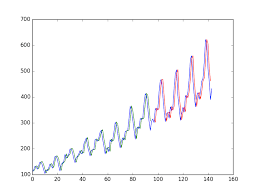
Enhancing Time Series Forecasting with Machine Learning Algorithms
Time Series Forecasting with Machine Learning
Time series forecasting is a powerful technique that involves predicting future values based on historical data. With the advent of machine learning, this traditional statistical method has been revolutionized, offering more accurate and efficient predictions.
Machine learning algorithms can analyse large volumes of time series data to identify patterns, trends, and seasonality. By training these algorithms on historical data, they can learn to make accurate forecasts for future time points.
One popular machine learning algorithm used for time series forecasting is the Long Short-Term Memory (LSTM) network. LSTM networks are a type of recurrent neural network that can capture long-term dependencies in sequential data, making them ideal for time series analysis.
Another commonly used algorithm is the Autoregressive Integrated Moving Average (ARIMA) model. ARIMA models are based on statistical methods and are effective in capturing complex patterns in time series data.
Time series forecasting with machine learning has various applications across industries, such as finance, healthcare, retail, and more. Companies use these techniques to predict stock prices, patient outcomes, sales trends, and other critical metrics.
By leveraging the power of machine learning for time series forecasting, businesses can make informed decisions based on accurate predictions and gain a competitive edge in today’s fast-paced world.
Overall, time series forecasting with machine learning offers a sophisticated approach to analysing and predicting future trends in sequential data. As technology continues to advance, we can expect even more innovative solutions to enhance the accuracy and efficiency of time series forecasting.
Top FAQs: Understanding Algorithms and Concepts in Time Series Forecasting for Machine Learning
- Which ML algorithm is best for time series forecasting?
- What is time series forecasting in machine learning?
- Which algorithm is used for time series forecasting?
Which ML algorithm is best for time series forecasting?
When it comes to time series forecasting with machine learning, the question of which ML algorithm is best often arises. While there is no one-size-fits-all answer, several algorithms have proven to be effective in this domain. Popular choices include the Long Short-Term Memory (LSTM) network, known for capturing long-term dependencies in sequential data, and the Autoregressive Integrated Moving Average (ARIMA) model, which excels at capturing complex patterns in time series data. Ultimately, the best ML algorithm for time series forecasting depends on factors such as the nature of the data, the specific forecasting task, and the desired level of accuracy and interpretability. Experimenting with different algorithms and tuning their parameters is key to finding the most suitable approach for a given forecasting problem.
What is time series forecasting in machine learning?
Time series forecasting in machine learning refers to the process of predicting future values based on historical data that is ordered chronologically. It involves using various machine learning algorithms to analyse patterns, trends, and seasonality within time series data, enabling accurate predictions for future time points. By training models on past observations, time series forecasting aims to capture the underlying patterns in the data and make informed forecasts for upcoming events or trends. This technique is widely used across industries to anticipate changes, make strategic decisions, and improve planning based on predictive insights derived from historical time series data.
Which algorithm is used for time series forecasting?
When it comes to time series forecasting in machine learning, various algorithms can be employed to predict future values based on historical data. Some popular algorithms used for time series forecasting include the Long Short-Term Memory (LSTM) network, Autoregressive Integrated Moving Average (ARIMA) model, Prophet algorithm, and Exponential Smoothing methods. Each algorithm has its strengths and is chosen based on the specific characteristics of the time series data being analysed. Researchers and practitioners often experiment with different algorithms to determine which one best suits their forecasting needs and yields the most accurate predictions.
